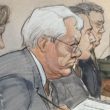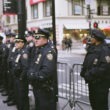Reprising Molly Ivins
“You could stand on the corner in Austin and spit across three Congressional districts because of what DeLay did.”—Defense attorney Dick DeGuerin quoting Molly Ivins
I thought I had walked into the wrong courtroom. The electronic bulletin board that lists criminal defendants read: “DeLay, Thomas Dale.” The former majority leader had just done a “perp walk” past the local TV news crews and I had walked in behind him. Why was Ronnie Earle on trial?
Earle is the former Travis County district attorney. He had indicted DeLay in 2005, which led to DeLay’s resignation from the U.S. House of Representatives.
The defense attorneys in the courtroom, representing DeLay (and John Colyandro and Jim Ellis, who were indicted several days before DeLay) were building a case against Earle. They argued that he had engaged in “outrageous prosecutorial misconduct.” He had made “a movie about this very case” and granted interviews to Vanity Fair, Bill Moyers, and 60 Minutes. (Earle, before he retired two years ago, had appeared in a documentary in which two of the defense attorneys in the room also appeared.)
Dick DeGuerin, who represents DeLay, was programmatic. He led the judge through 15 questions that the prosecution had to answer before the case could move forward. None of the questions pertained to the change of venue DeLay had requested in his trial for money laundering and conspiracy.
DeGuerin focused on Earle and the transition between a grand jury that had handed down a no-bill on the Friday its term ended and the “neophyte” grand jury that indicted DeLay the following Monday. He wanted a full accounting of the “shenanigans” Earle had used to a persuade a grand jury to indict DeLay in less than one full day.
DeGuerin has defended clients as diverse as John Demjanjuk (the Nazi death camp guard known as “Ivan the Terrible”) and Texas Senator Kay Bailey Hutchison (while she was Texas state treasurer). DeGuerin is a brilliant lawyer and it’s a pleasure and a privilege to watch him in the courtroom. By the time he read through his list of questions, I was convinced that the judge had no choice but to rule in favor of defense attorneys’ motions and vacate the indictments against the three men.
Then Judge Pat Priest asked a simple question: “Is there a case on point” that would support the argument about how the former D.A. had worked the two grand juries?
“There should be, if there isn’t,” DeGuerin said.
“Generally speaking, the defense is standing in a very deep hole with a very short stick on all these issues,” the judge said.
If his lawyer understood how badly positioned DeLay was, DeLay didn’t. At the conclusion of the first day of a two-day hearing, he walked from the courtroom into the frames of a half-dozen TV cameras and delivered the sort of bravura performance that had been his signature mark when he was at the pinnacle of power in Washington.
“We know what this is about,” DeLay said. “This is a political maneuver by a rogue district attorney and I had to leave Congress because of it.” DeLay said his trial would be moved out of Austin, he would be exonerated, and more:
“Later on when this is all over we want to look at the fact that a locally elected district attorney can go after federally elected people. …There’s so much that’s unconstitutional in this whole thing. … We’re going to reform the statute. We’re going to reform the justice system.”
TEXAS TWO STEP—Nine years have passed since DeLay, John Colyandro and Jim Ellis formed Texans for a Republican Majority (TRMPAC), to raise money to fund election campaigns in Texas.
Colyandro had worked for R.J. Reynolds Tobacco Company and later as a political fundraiser for the Republican House leadership. Ellis had worked for political strategist Karl Rove. DeLay was the “honorary” chair of TRMPAC, which raised $1.55 million and spent it on 27 Texas legislative races in 2002, electing the first Republican House and Senate since Reconstruction.
Texas had been reapportioned under the supervision of a panel of federal judges in 2001, after the Legislature failed to agree on a plan. With a Republican Legislature in place and a Republican governor in office, DeLay decided to redo the 2001 reapportionment, even though apportionment is always done in the first legislative session after the decennial census. In 2003 he traveled to Austin and took control of the redistricting process, creating five new districts that included solid Republican voter bases.
In raising money for the election that allowed redistricting, the TRMPACers had made one critical mistake. It is against the law to spend corporate money on elections in Texas. TRMPAC raised at least $190,000 in corporate (or soft) money, which they sent to the Republican National State Elections Committee in Washington, D.C. Three weeks later, the committee returned a $190,000 check that was described as (hard) money raised from individuals rather than corporations.
To the Travis County D.A., the round trip looked a lot like money laundering, along with conspiracy to launder money.
COUNTYWIDE CRIME SCENE—On the second day of the pre-trial venue hearing, defense attorneys made their venue arguments. They claimed that DeLay had so antagonized residents of Austin that he could never get a fair trial here. And that the media and “powerful individuals and organizations” working against DeLay have poisoned the jury pool. As evidence, they introduced a portfolio of dated political cartoons skewering DeLay.
As one example of news coverage that influenced potential jurors, DeGuerin quoted the late Molly Ivins, who had written: “You could stand on the corner in Austin and spit across three Congressional districts because of what DeLay did.” (It was a bit of overstatement, but the district lines DeLay imposed on the city did make it possible to walk across three districts, that extended from Houston to the border with Mexico, in one single block in central Austin.)
The defense attorneys also introduced a recent poll that found that Tom DeLay is as well known and as unpopular in Travis County as is former President George W. Bush.
Pat Priest is a senior judge from San Antonio, to whom the case was assigned after defense attorneys argued that the Travis County judge who originally drew the case was too connected to the Democratic Party.
Priest was hard to read — until the end of the second day. Then he addressed an argument that DeLay’s attorneys had made: that the state was standing between DeLay and a speedy trial. DeLay’s codefendants, Priest said, had filed a habeas appeal challenging the constitutionality of the statute under which all the defendants were prosecuted. The “expedited” appeal sat in a regional appeals court for three and a half years until the Texas Court of Criminal Appeals intervened and ruled that DeLay and his codefendants could be tried.
Priest concluded the two-day hearing with a description of a San Antonio case in which a nurse had been brutally murdered and the alleged murderer, who had hidden the body, was in the county jail refusing to talk. As a young lawyer defending the accused murderer, Priest had obtained a change of venue because the entire town had turned against his client.
“This is not that kind of case,” he said, denying every motion of substance the defense attorneys filed.
DeLay goes to trial in Travis County on October 26. Leaving the courtroom he was more subdued than he had been at the end of the first day.
“I’m disappointed,” he said. “I hope I can get a fair trial here.”





0 Comments